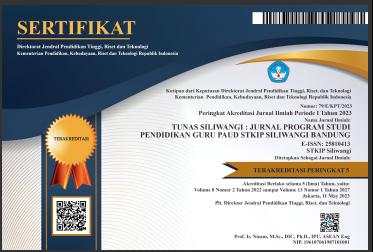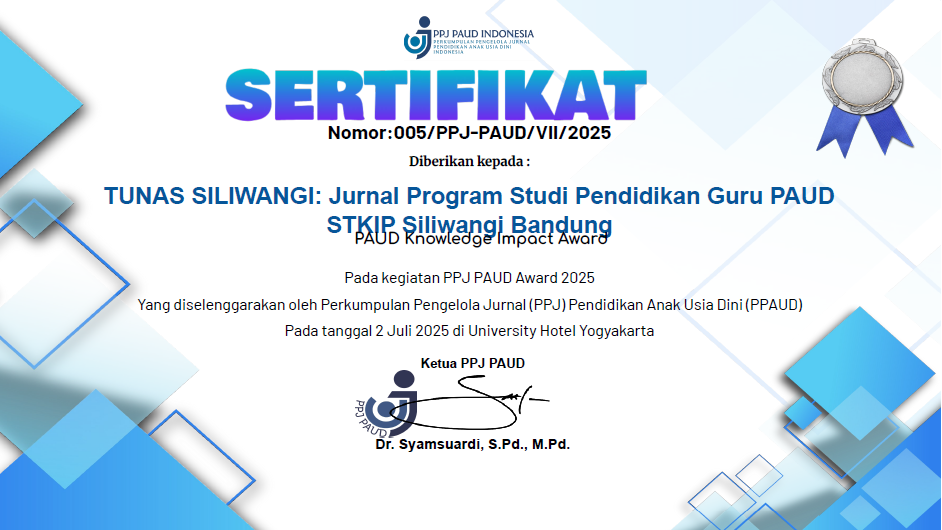HUBUNGAN KONSEP DIRI GURU TERHADAP REGULASI DIRI ANAK USIA DINI (Penelitian Korelasional Pada Guru dan Peserta Didik PAUD di Kecamatan Sumedang Selatan)
DOI:
https://doi.org/10.22460/ts.v3i2p160-174.648Abstract
Penelitian ini dilatarbelakangi oleh masih banyaknya guru PAUD yang belum menangani peserta didiknya dengan tepat sehingga timbul masalah-masalah kemandirian yang tidak terlatih dengan baik. Demikian pula masalah-masalah persepsi diri guru tentang kompetensi dirinya dalam berbagai aspek. berdasarkan hal tersebut penelitian ini bertujuan memaparkan tentang konsep diri guru PAUD, yaitu persepsi guru tentang dirinya dan seperti apa hubungan antara konsep diri guru dengan regulasi diri pada anak usia dini. Data peneltian diambil dengan metode survey yang menggunakan kuesioner SPPA (Self Perception Profile for Adult) dari konsep multidimensi persepsi diri Susan Harter. Penelitian ini menggunakan pendekatan kuantitatif dengan menggunakan analisis korelasi Pearson Product Moment untuk mencari seberapa besar hubungan antara konsep diri guru dan regulasi diri peserta didiknya. Hasil penelitian menunjukkan tidak terdapat korelasi antara konsep diri guru dengan regulasi diri peserta didik, Gambaran lain hasil nilai persepsi diri guru menunjukkan bahwa sebagian besar guru memiliki angka diskrepansi yang mempengaruhi skala keberhargaan atau self esteem guru. Hal tersebut menunjukkan bahwa sebagian besar guru mengalami ketidakselarasan atau incongruency sehingga memunculkan diskrepansi nilai yang berpengaruh terhadap self worth atau rasa keberhargaan diri guru. Semakin tinggi diskrepansi sebuah skala, maka semakin rendah tingkat keberhargaan diri yang terkait dengan rasa percaya diri individu yang bersangkutan, demikian pula sebaliknya. Atas berbagai temuan dalam penelitian ini, maka rekomendasi yang dapat diberikan adalah bahwa setiap guru wajib mengembangkan potensi dirinya sesuai dengan potensi yang telah melekat dalam dirinya agar dapat mengaktualisasikan dirinya dengan optimal.
References
Akdon, (2008)., Aplikasi Statistika & Metode Penelitian., Bandung., Dewa Ruchi.
Alpay, E. (2000).,Self Concept and Self Esteem., Dept. of Technical Engineering & Chemical Technology, Imperial College of Science. Diakses dari [online] http://www.ljemail.org/reference/ReferencesPapers.aspx?Referene ID=658725 (22 Mei 2014)
Bandura., (1991)., Social Cognitive Theory of Self Regulation., Stanford University., (50) 248- 287 . Doi. 10.1016/0749-5978(91)90022-L
Bee, HL.& Mitchell, SK., 1984, The Developing Person (a Life Span Approach), New York, Harper and Row Publisher.
Bracken &Lamprecht., (2003)., Positive Self Concept : An Equal Opportunity Construct., School Psychology Quarterly., Vol. 18 (2)., 103-121.
Burns, RB.,1978., KonsepDiri (Teori, Pengukuran, Perkembangan&Perilaku), New York: Longman Group Limited
Carlton &Winsler., (1998).,Fostering Intrinsic Motivation In Early Childhood Classroom., Early Childhood Education Journal Vol. 25 (3) 159-166., Doi. 10.1023/A:1025601110383 #page-1
Cervone, D.&Pervin, LA.,(2011), Kepribadian _Teori & Penelitian, Jakarta, Salemba Humanika.
Chang, et all., (2003)., Life satisfaction, self-concept, and family relations in Chinese adolescents and children., International Journal of Behavioral Department., Vo. 27 (2)., 182-289. Doi: 10.1080/01650250244000182
Donellan, MB., et all. (2005)., Low Self Esteem is Related to Agression, Anti Social Behavior & Delinquency., American Psychological Society, Vol (4) 327 – 335.
Glotova& Wilhelm, (2014).,Teacher’s Self-Concept And Self-Esteem In Pedagogical Communication., Social & Behavioral Science Vol. 132., 509-514.Doi. 10.1016/j.sbspro.2014.04.345
Hall & Lindzey, 1978, Theories of Personality, United States of America, John Willey & Sons, Inc.
Harter & Messer., (2012).,The Self-Perception Profile For Adult : Manual & Questionnaires., University of Denver.
Harter, S., (2007)., The Self : Social Emotional and Personality Development, John Wiley and Son., Doi: 10.1002/9780470147658
Harter., (1988)., The Construction & Conservation of The Self., Dalam Lapsley& Power (Penyunting), Self, Ego & Identity, (hlm. 43-70). New York Inc. Springer-Verlag.,
Hasan, Ghazali & Ahmad, (2011). The Relationship Between Self Concept And Response Towards Student’s Academic Achievement Among Student Leaders In University Putra Malaysia., International Journal of Instruction., Vol. 4(2)., p. 23-38.
Helmi, AF., (1999)., Gaya Kelekatan Dan KonsepDiri, JurnalPsikologi, No. (1)., 9-17., Universitas Gajah Mada.
Hurlock, EB., (1978)., PerkembanganAnak (2)., Jakarta, Erlangga
Kemdikbud, (2013).,Ada Apa dengan Pendidikan Anak Usia Dini di Indonesia., diakses [online] dari http://paud.kemdikbud.go.id/ (20/11/2013).
Kheruniah., (2013)., A Teacher Personality Competence Contribution To A Student Study Motivation And Discipline To Fiqh Lesson., International Journal of Scientific Research Vol 2 (2).
Malar, L., et all. (2011).,Emotional Brand Attachment and Brand Personality: The Relative Importance of the Actual and the Ideal Self., AMA Journal Vol. 75 (40) p 35 – 52., Doi. 10.1509/jmkg.75.4.35
McCLelland & Cameron., (2011)., Self Regulation In Early Childhood : Improving Conceptual Clarity And Developing Ecologically Valid Measure, The Society for Research In Child Development., Vol 6 (2) 136-142 Doi. 10.1111/j.1750-8606.2011.00191.x
Mercer., (2011)., How Do Learner Form Their Self Concept, Educational Linguistic 73-94, Doi.10.1007/978-90-481-9569-5_4
MI., (2016, 30 September)., Kualitas Guru PAUD Perlu Ditingkatkan., Media Indonesia., diakses [online] http://www.mediaindonesia.com/news/read/69604/kualitas-guru-paud-perlu-ditingkatkan/2016-09-30
Perger., (2001)., Preprofessional self concept of Teacher Training College Student in Hungary, Review of Psychology vol.8 (1-2).
Pratt, (1991)., Conception of the Self Within China & US :Contrastin Foundation For Adult Education., International Journal of Inter Cultural Relations, Vol. (15) pp. 285-310.., USA., Pergamon Press., Doi. 10.1016/0147-176728912990003-Y
Reitzes, DC. &Mutran, EJ. (2006).,Self and Health :Factors That Encourages Self Esteem &FucttionalHelath., Journal of Gerontologi : Social Science Vol 61 B (544-551), Response Towards Student’s Academic Achievement Among Students Leaders In University Putra Malaysia., International Journal of Instruction 4(2), p. 23-38.
Risma., D., (2015)., Pemetaan Penerapan Modifikasi Perilaku Kognitif Pada Anak Usia Dini oleh Pendidik PAUD di Pekanbaru., Educhild Vol. 4(1) p.64-71.
Rogers, CR., (1959)., A Theory of Therapy, Personality and Interpersonal Relationship as Developed in The Client Centered Framework, Dalam Sigmund Koch, (penyunting) Psychology: A Study of a Science, Formulations of the Person and the Social Context, (p. 184-256). McGraw-Hill.
Rosenberg, M., (1989).,Self Concept Research : A Historical Review., diakses [online] dari http://sf.oxfordjournals.org Vol. 68 (1) : p. 34 – 44. Doi 10.1093/sf/68.1.34
Rosenberg.,et all., (1995)., Global Self-Esteem And Specific Self-Esteem: Different Concepts, Different Outcomes., American Sociological Review., Vol. 60 (1) 141-156.,
Santrock, J.W. (2002).,Life Span Development, University of Texas, Dallas,. Brown and Bench-mark
Undang-undang Republik Indonesia Nomor 14 Tahun 2005 Tentang Guru Dan Dosen
Wenglinsky, H., 1996. Measuring Self Concept and Relating It To Academic Achievement : Statistical Analyses of The Marsh Self–Description Questionnaire., ETS Research Report Series Vol. 1996., p. 1-51 10.1002/j.2333-8504.1996.tb01716.x
Yanuar., (2016, 9 Mei)., Sekolah PAUD Bisa Berbahaya, Mengapa ?., Liputan 6., diakses [online] http://news.liputan6.com/read/2502709/sekolah-paud-bisa-berbahaya-mengapa
Zeeman, RD., (2006) Glasser's Choice Theory and Purkey's Invitational Education-Allied Approaches to Counseling and Schooling., International Journal of Reality Therapy vol xxvi (46-51).
Zimmerman & Pons., (1988), Construct Validation of Strategy Model of Student Self Regulated Learning, Journal Educational Psychology, Vol. 80(3), 284-290., Doi. 10.1037/0022-0663.80.3.284
Zimmerman, BJ., (2002)., Becoming A Self Regulated Learner : An Overview., Theory Into Practice, vol. 41 (2)., 64-70, Doi. 10.1207/s15430421tip4102_2
Zimmerman., BJ., (1990). Self Regulated Learning And Academic Achievement : An Overview, Educational Psychologist, 25 (1) 3-17. Doi. 10.1207/s15326985ep2501.2
Downloads
Published
Issue
Section
License
Copyright (c) 2025 Siti Noor Rochmah

This work is licensed under a Creative Commons Attribution-ShareAlike 4.0 International License.
The author is responsible for acquiring the permission(s) to reproduce any copyrighted figures, tables, data, or text that are being used in the submitted paper. Authors should note that text quotations of more than 250 words from a published or copyrighted work will require grant of permission from the original publisher to reprint. The written permission letter(s) must be submitted together with the manuscript.






